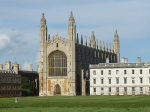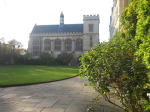UK News
-
 The Queen unveils 50th Coronation Library at Moreland Primary School in London
In celebration of her advocacy for literacy and education, Her Majesty The Queen, Patron of the National Literacy Trust, graced Moreland Primary School with her presence to inaugurate theirRead More...
The Queen unveils 50th Coronation Library at Moreland Primary School in London
In celebration of her advocacy for literacy and education, Her Majesty The Queen, Patron of the National Literacy Trust, graced Moreland Primary School with her presence to inaugurate theirRead More... -
 Prince Harry arrives in London without plans to meet King Charles III
Prince Harry, the Duke of Sussex, has landed in London to commemorate the 10th anniversary of the Invictus Games but will not be meeting with his father, King Charles III,Read More...
Prince Harry arrives in London without plans to meet King Charles III
Prince Harry, the Duke of Sussex, has landed in London to commemorate the 10th anniversary of the Invictus Games but will not be meeting with his father, King Charles III,Read More... -
 Shaping tomorrow: Sadiq Khan's vision for a fairer, safer, and greener London
Sadiq Khan, embarking on an unparalleled third term as the Mayor of London, is determined to forge a metropolis that is fairer, safer, and greener, catering to the needs of all its diverseRead More...
Shaping tomorrow: Sadiq Khan's vision for a fairer, safer, and greener London
Sadiq Khan, embarking on an unparalleled third term as the Mayor of London, is determined to forge a metropolis that is fairer, safer, and greener, catering to the needs of all its diverseRead More... -
 Woman traumatized after encounter with fake police officer on M1
A motorist left traumatized after being ordered to stop on a motorway by a man impersonating a police officer has been informed that there will be no criminal investigation,Read More...
Woman traumatized after encounter with fake police officer on M1
A motorist left traumatized after being ordered to stop on a motorway by a man impersonating a police officer has been informed that there will be no criminal investigation,Read More... -
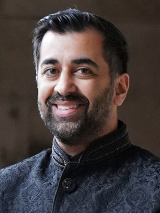 Humza Yousaf steps down as Scotland's first minister
Following John Swinney's election as the new leader of the SNP, Humza Yousaf has submitted his resignation letter to King Charles, marking the end of his tenure as Scotland's first minister.Read More...
Humza Yousaf steps down as Scotland's first minister
Following John Swinney's election as the new leader of the SNP, Humza Yousaf has submitted his resignation letter to King Charles, marking the end of his tenure as Scotland's first minister.Read More...

Culture
-
 Pippa Middleton and James Matthews unveil lodge at Bucklebury Farm
Pippa Middleton and her billionaire husband James Matthews have inaugurated the lodge at Bucklebury Farm Park in Berkshire, offering a venue for parties, events, and Pilates sessions.Read More...
Pippa Middleton and James Matthews unveil lodge at Bucklebury Farm
Pippa Middleton and her billionaire husband James Matthews have inaugurated the lodge at Bucklebury Farm Park in Berkshire, offering a venue for parties, events, and Pilates sessions.Read More... -
 Five British museums nominated for prestigious arts prize
Museums across Skipton, Dundee, Manchester, and London are vying for the esteemed title of Museum of the Year 2024.Read More...
Five British museums nominated for prestigious arts prize
Museums across Skipton, Dundee, Manchester, and London are vying for the esteemed title of Museum of the Year 2024.Read More... -
 Gustav Klimt portrait sells for £25.7 million at Vienna auction
A long-lost portrait by Gustav Klimt, depicting a young woman, fetched a staggering 30 million euros (£25.7 million) at an auction held in Vienna on Wednesday.Read More...
Gustav Klimt portrait sells for £25.7 million at Vienna auction
A long-lost portrait by Gustav Klimt, depicting a young woman, fetched a staggering 30 million euros (£25.7 million) at an auction held in Vienna on Wednesday.Read More... -
 Rishi Sunak: remembering those lost in terror attack
In his Passover message to the Jewish community, Prime Minister Rishi Sunak acknowledges the somber reality that "for too many families, there will be empty seats" at the Seder table thisRead More...
Rishi Sunak: remembering those lost in terror attack
In his Passover message to the Jewish community, Prime Minister Rishi Sunak acknowledges the somber reality that "for too many families, there will be empty seats" at the Seder table thisRead More... -
 Co-op Live: Manchester's new arena opens with high capacity and ambitions
A monumental addition to Manchester's entertainment landscape, the new £365m Co-op Live arena is poised to claim the title of the largest indoor arena in the UK. Nestled beside ManchesterRead More...
Co-op Live: Manchester's new arena opens with high capacity and ambitions
A monumental addition to Manchester's entertainment landscape, the new £365m Co-op Live arena is poised to claim the title of the largest indoor arena in the UK. Nestled beside ManchesterRead More... -
 Brontë birthplace unveils open day prior to renovation
The birthplace of the renowned Brontë sisters is set to welcome visitors for a special glimpse inside before embarking on a significant refurbishment.Read More...
Brontë birthplace unveils open day prior to renovation
The birthplace of the renowned Brontë sisters is set to welcome visitors for a special glimpse inside before embarking on a significant refurbishment.Read More... -
 Taylor Swift's 'The Tortured Poets Department' smashes Spotify record
Taylor Swift's latest album, "The Tortured Poets Department," has shattered Spotify's record for the most-streamed album in a single day, the platform has announced. Not only did Swift'sRead More...
Taylor Swift's 'The Tortured Poets Department' smashes Spotify record
Taylor Swift's latest album, "The Tortured Poets Department," has shattered Spotify's record for the most-streamed album in a single day, the platform has announced. Not only did Swift'sRead More... -
 Historic London pub, linked to Royalty, ravaged by fire: a heartbreaking loss
A renowned London pub, steeped in history dating back possibly to the 16th century, has suffered extensive damage in a devastating fire. The Burn Bullock, a grade II-listed establishmentRead More...
Historic London pub, linked to Royalty, ravaged by fire: a heartbreaking loss
A renowned London pub, steeped in history dating back possibly to the 16th century, has suffered extensive damage in a devastating fire. The Burn Bullock, a grade II-listed establishmentRead More... -
 Salvator Rosa painting stolen from Oxford, recovered in Romania, and returned to UK
A painting valued at EUR 2 million, stolen from an art gallery at Oxford University approximately four years ago, has been recovered in Romania and returned to UK judicial authorities,Read More...
Salvator Rosa painting stolen from Oxford, recovered in Romania, and returned to UK
A painting valued at EUR 2 million, stolen from an art gallery at Oxford University approximately four years ago, has been recovered in Romania and returned to UK judicial authorities,Read More... -
 Plans to demolish former Museum of London site put on pause
A last-minute intervention from Levelling Up Secretary Michael Gove has halted plans to demolish the former Museum of London site.Read More...
Plans to demolish former Museum of London site put on pause
A last-minute intervention from Levelling Up Secretary Michael Gove has halted plans to demolish the former Museum of London site.Read More... -
 June’s London Fashion Week returns with fresh concept
The British Fashion Council has unveiled an innovative approach for the upcoming London Fashion Week in June, aiming to spark a cultural phenomenon. Set to take place fromRead More...
June’s London Fashion Week returns with fresh concept
The British Fashion Council has unveiled an innovative approach for the upcoming London Fashion Week in June, aiming to spark a cultural phenomenon. Set to take place fromRead More... -
 London's inaugural Taiwanese culture festival explores island's identity and history
London's vibrant Notting Hill district is about to experience a taste of Taiwanese culture with the launch of the 16-day Taiwan Festival on Friday, April 12.Read More...
London's inaugural Taiwanese culture festival explores island's identity and history
London's vibrant Notting Hill district is about to experience a taste of Taiwanese culture with the launch of the 16-day Taiwan Festival on Friday, April 12.Read More... -
 Soho showcase: The Art of Banksy unveils London's largest collection
The largest collection of original Banksy artworks is set to make its debut in London's Soho, featuring over 150 pieces from the enigmatic Bristol-based artist. Opening at 100 CharingRead More...
Soho showcase: The Art of Banksy unveils London's largest collection
The largest collection of original Banksy artworks is set to make its debut in London's Soho, featuring over 150 pieces from the enigmatic Bristol-based artist. Opening at 100 CharingRead More...

British Queen celebrates
Most Read
- Teen held after US woman killed in London stabbings
- Heave-ho Harry! Prince prepares to join the walking wounded in ice trek to North Pole
- Football: Farhad Moshiri adamant Everton deal above board
- "Master of English Style". Interview with Designer Lydia Dart
- Letter to the Financial Times from Lord Mayor Alderman Michael Bear
World News
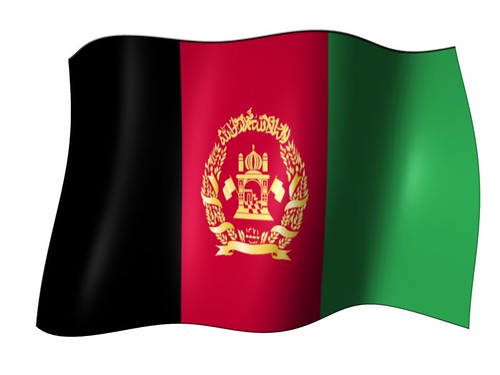
An Afghan police officer and cook poisoned their colleagues at a checkpoint in an assault co-ordinated with rebel fighters which left six dead in the country's south, officials say.
It was the latest in a string of attacks from inside the Afghan army and police that are threatening to undermine both the partnership with international troops - which have been the target of many attacks - and the morale of Afghan forces, who have suffered equally heavy casualties from such strikes.
The police officer and the cook worked with outside insurgents in the assault, which hit police manning a checkpoint in the Gereskh district of Helmand province, the governor's office said in a statement.
They poisoned two of the officers and then the militants attacked from outside, killing the remaining four officers, provincial spokesman Ahmad Zirak said. He did not say how the officers were poisoned.
The police officer was captured as he fled, but the cook escaped and remains at large, Mr Zirak added.
The insurgent gunmen escaped by motorcycle with weapons and ammunition, the governor's statement said.

Three jailed members of the Russian band Pussy Riot have told an appeal court they should not be imprisoned for their irreverent protest against president Vladimir Putin.
The women insisted that their impromptu performance inside Moscow's main cathedral was political in nature and not an attack on religion.
Dressed in neon-coloured miniskirts and tights, with homemade balaclavas on their heads, the women performed a "punk prayer" asking Virgin Mary to save Russia from Mr Putin as he headed into a March election that would hand him a third term. They were convicted in August of hooliganism motivated by religious hatred and sentenced to two years in prison.
"We didn't mean to offend anyone," said Maria Alekhina, who along with Nadezhda Tolokonnikova and Yekaterina Samutsevich spoke in court from inside a glass cage. She said they were protesting at Mr Putin and also the Russian Orthodox Church hierarchy for openly supporting his rule.
"We went to the cathedral to express our protest against the joining of the political and spiritual elites," Ms Alekhina said.
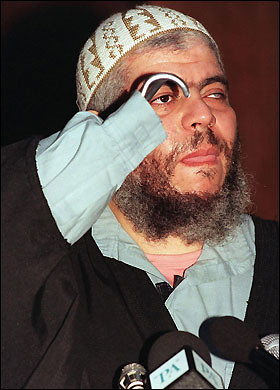
Radical cleric Abu Hamza will face trial in the US next year after pleading not guilty to terrorism charges in a New York court.
Hamza, indicted under the name Mustafa Kamel Mustafa, entered his plea at the Manhattan federal court before US District Judge Katherine B Forrest who set a trial date for August 26 2013.
He touched down in America on Saturday after he was kicked out of the UK following a failed appeal against extradition at the High Court on Friday.
He was jailed in the UK for seven years for soliciting to murder and inciting racial hatred in 2006 and first faced an extradition request from the Americans in 2004.
Hamza has been charged with 11 counts of criminal conduct related to the taking of 16 hostages in Yemen in 1998, advocating violent jihad in Afghanistan in 2001, and conspiring to establish a jihad training camp in Bly, Oregon, between June 2000 and December 2001.
Hamza arrived in court on Saturday without the prosthetic hook he wears in place of one hand and he appeared without the hook again in court on Monday.
His lawyer Sabrina Shroff said then that he needed the hook back "otherwise, he will not be able to function in a civilised manner".
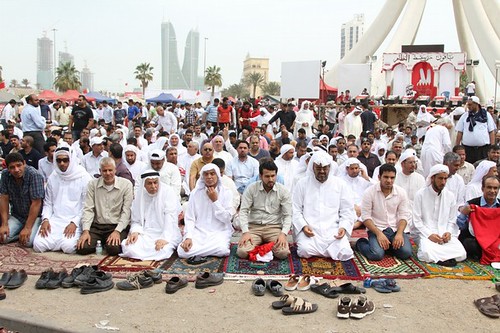
Riot police in Bahrain have fired tear gas and stun grenades during clashes with protesters who broke away from a funeral procession for a 17-year-old boy killed during earlier street battles with security forces in the Gulf kingdom.
Thousands of mourners took part in the funeral march, chanting anti-government slogans and waving Bahraini flags.
Later, smaller groups of several hundred demonstrators broke away and hurled stones at police units.
The death of the boy late on Friday could stir more tensions between forces for the Sunni-led monarchy and groups from Bahrain's Shiite majority seeking a greater political voice.
More than 50 people have died including protesters and police, in almost 20 months of political turmoil in the strategic island nation, which is home to the US Navy's 5th Fleet.
The Shiite-led protests are aimed at breaking Sunni minority rulers' monopoly on power in Bahrain. They started in February 2011 and were inspired by other Arab Spring revolts against authoritarian regimes in the region.
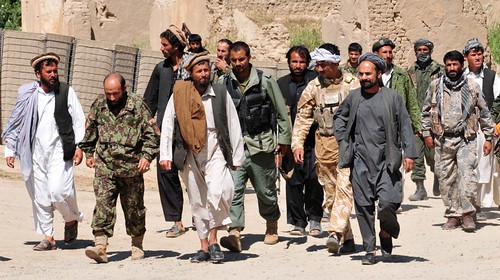
The Pakistani politician who put a bounty on the anti-Islam filmmaker's head has impressed the country's Taliban militants so much that they are taking him off their hit list.
The man behind the "Innocence of Muslims", Nakoula Basseley Nakoula, has put his US home up for sale and gone into hiding since violence erupted over the 14-minute YouTube trailer for "Innocence of Muslims," which also has sparked debate over freedom of expression in the US and in Europe.
Pakistani railways minister Ghulam Ahmad Bilour offered his 100,000 dollar (£62,000) reward on Saturday for anyone who kills Mr Nakoula.
Mr Bilour also appealed to al Qaida and Taliban militants to help eliminate the filmmaker, while Pakistan's government said the bounty reflected his personal view and was not official policy.
The minister belongs to the secular Awami National Party, an ally in the government of President Asif Ali Zardari. His comments drew criticism within his own party, which is considered anti-Taliban and has lost several leaders in the fight against the insurgency.
A Pakistani Taliban spokesman said the minister's views represent the true spirit of Islam, and that, consequently, the insurgents have removed him from their hit list. But while Bilour gets an "amnesty," others in his party are still fair game, he said.
Muslims have been angered by the crude, amateurish film's portrayal of the Prophet Mohammed as a fraud, a womaniser and a child molester. Dozens of people, including the US ambassador to Libya, have died in violence linked to protests over the movie.
Separately, a breakaway faction of the Afghan Taliban announced its own bounty for those behind the film. The group is offering almost £300,000 in gold.

The proposed merger of EADS with BAE Systems could get a push this week when defence ministers of Germany, Britain and France meet to draw up a common position on the multi-billion-dollar bid.
The proposed merger between the European Aeronautic Defence and Space Company (EADS) and British arms maker BAE Systems has raised major concern in Britain on fears that it would put a strategic company in foreign control, prompting a parliamentary commission to launch a probe on the issue.
It has also sparked worries over Britain's political relationship with the United States, from where BAE derives almost half its business.
And in Berlin, the parliamentary economic affairs commission raised serious doubts over the merger in a report, citing fears over the future of EADS's European sites, among other concerns.
Amid increasing doubts on the merger, an advisor to the French defence ministry told AFP that defence ministers from the three countries would meet this week in Cyprus to discuss the project.
"A first tripartite discussion at the defence minister level will be held in Cyprus on the EADS/BAE file on Wednesday or Thursday," the aide said.
He added that the meeting would take place within the framework of an informal meeting of defence ministers on the eastern Mediterranean island.
The meeting comes as a group of British deputies tasked with scrutinising defence policy announced on Monday a probe into the impact of a tie-up on British defence, "including the protection of sovereign capabilities."
The inquiry carried out by the Defence Committee, made up of lawmakers from across British political parties, is to extend through October and November.
"The (British) Defence Committee is today announcing its inquiry into the possible merger of BAE Systems with EADS," a statement said on Monday.
"The merger of two such large defence contractors would have a significant and strategic impact on their relationships with UK, US and European governments.
"It could also radically alter the defence industrial base in these countries. The inquiry will examine the likely impact of such a merger on UK defence including the protection of sovereign capabilities and the nature of the defence industrial base," the statement added.
The announcement was made as it emerged that British Prime Minister David Cameron had spoken with his counterparts in France and Germany about the tie-up.
Cameron's official spokesman declined to give details of the discussions but said that "given the nature of the companies' activities... we need to ensure that the UK's public interest is properly protected.
"We are working with the companies to ensure that that is the case. We are also talking to people in other countries about this."
In Berlin, the German parliamentary economic affairs commission said in a report that there have been inadequate guarantees on keeping company sites open. EADS has operations in France, Germany and Spain.
It also noted reservations over the fact that EADS, the parent company of Airbus, would hold only 60 percent of the new group under the proposed $45-billion (35-billion-euro) deal, and that veto rights of participating countries would be limited.
The planned merger was a major topic in talks between German Chancellor Angela Merkel and French President Francois Hollande over the weekend.
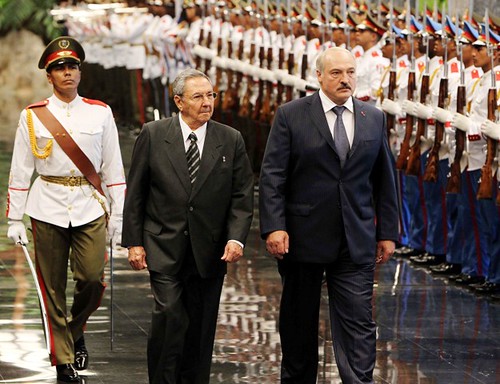
Strongman Alexander Lukashenko was set to keep his forces in power Sunday as ex-Soviet Belarus elected a parliament in polls the united opposition refused to recognise even before they closed.
With the man branded Europe's last dictator keen to show off his democratic credentials and avoid a re-run should turnout dip below 50 percent, a barrage of state TV spots urged citizens to cast their ballots.
But despite the state message polling stations looked empty, and even the head of Central Election Committee admitted voting was "weak", confirming the lack of interest in a process in which most candidates already work for the state.
At a polling station in one of the capital's schools, pensioner Alla said she had voted for the incumbent pro-Lukashenko deputy in her district, but confessed she knew little about him or what he had done in the past four years.
"I haven't heard anything about his activities over the past term, but I think he is worthy of representing me," she told AFP.
Lukashenko, who arrived at his polling station with his young son Kolya in tow, praised the "calmness" of the polls: "There is nothing to criticise so far," he told journalists.
"They should envy our boring elections. We don't need any revolutions or upheavals," the 18-year presidential veteran said,
Nearly two years after unleashing a crackdown on demonstrators who dared question the scale of his election to a fourth term, Lukashenko faces hardly a challenge from his scattered and weakened foes.
Most opposition groups called for a boycott and pulled their candidates out of the race a week ago, telling people to protest by staying at home or even going fishing on election day.
But the authorities still appeared to be taking no chances, with about a dozen protesters arrested in the past week and thousands of flyers calling for a boycott confiscated.
At a press conference Sunday, opposition leaders proclaimed the election unfair, lacking in transparency, and undemocratic.
"Belarus authorities did not take the opportunity for democratic reform, did not change the electoral laws, did not free political prisoners, did not let the opposition into voting committees, used force against the opposition, and censored candidates," Belarus National Front party leader Alexei Yanukevich declared.
"This gives us the right not to recognise the results of the vote now, regardless of the outcome," a statement signed by five anti-Lukashenko groups said.
The last legislative polls in 2008 were swept by government forces, a scenario almost certain to play itself out again.

Libya's president has ordered all of the country's militias to come under government authority or disband - a move that appeared aimed at harnessing popular anger against the powerful armed groups following the attack that killed the US ambassador.
The assault on the US mission in Benghazi, which killed Ambassador Chris Stevens and three other Americans, has sparked an angry backlash among many Libyans against the myriad armed factions that continue to run rampant across the nation nearly a year after the end of the country's civil war.
On Friday, Benghazi residents staged a mass demonstration against the militias, and stormed the compounds of several armed groups in the city in an unprecedented protest to demand the militias dissolve.
President Mohammed el-Megaref said the militias, which the weak central government has relied upon for providing security in neighbourhoods and at state facilities since the removal of Colonel Muammar Gaddafi, must fall under the authority of the national government or be disbanded.
He said a joint operations room in Benghazi will coordinate between the various authorised armed brigades and the army. Armed groups operating outside the "legitimacy of the state" will be disbanded, and the military and police will take control over those militias' barracks, he said.
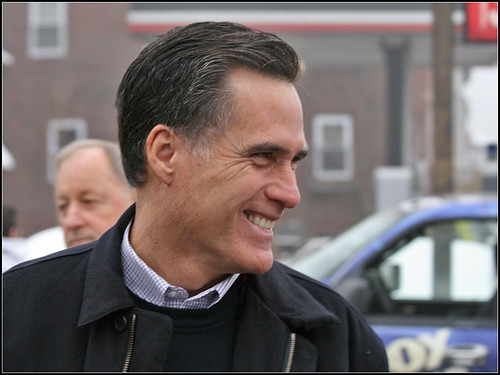
Mitt Romney told donors the Palestinians "have no interest whatsoever" in peace with Israel and if elected president he would just kick the issue down the road, a leaked video showed Tuesday.
The Republican White House hopeful had already faced a barrage of criticism over initial excerpts from the May 17 fundraiser in which he writes off Democratic voters as "victims" that are beyond his help.
The liberal news magazine Mother Jones revealed more excerpts from the $50,000-a-plate Florida event on Tuesday, this time on foreign policy, particularly related to the Israeli-Palestinian question.
Romney's commander-in-chief credentials were already under the microscope after he was widely condemned for launching a bitter attack on President Barack Obama in the immediate aftermath of the Benghazi assault, which claimed the lives of four Americans, including the Libyan ambassador.
Asked at the fundraiser if the "Palestinian problem" can be solved, Romney replied that the Palestinians have "no interest whatsoever in establishing peace, and that the pathway to peace is almost unthinkable to accomplish."
Displaying little nuance about different Palestinian factions, his remarks appear to dismiss the possibility that any Palestinian leaders are willing to work towards peace with Israel.
"I look at the Palestinians not wanting to see peace anyway, for political purposes, committed to the destruction and elimination of Israel, and these thorny issues, and I say there's just no way," he said.
"You move things along the best way you can. You hope for some degree of stability, but you recognize that this is going to remain an unsolved problem -- and we kick the ball down the field and hope that ultimately, somehow, something will happen and resolve it."

A French magazine has said it will publish topless pictures of Prince William's wife Catherine on Friday, in a move met with dismay by the royal couple.
Announcing a world exclusive, Closer magazine invited readers, via its website, to pick up the new edition and enjoy "the photos that the world can't wait to see; the Duchess of Cambridge topless on a guesthouse terrace".
The pictures were apparently taken while the British royals were on holiday in France last week.
The couple are currently in Malaysia and a source travelling with them said that "their royal highnesses were saddened to learn about the alleged photos".
"The incident, if true, turns the clock back 15 years," the source said, referring to the intense media attention on William's late mother Diana, who died in a car crash while fleeing paparazzi in Paris in 1997.
The royal source added that the monarchy was investigating the authenticity of the photos and would then "make a decision about what to do".
The story was picked up in the British media on Friday, less than a month after the publication of naked pictures of William's brother Harry.
Britain's younger royals are touring the globe throughout 2012 as part of celebrations marking the 60-year reign of William's grandmother, Queen Elizabeth II.
They are now on a nine-day trip that started in Singapore. They arrived in Malaysia on Thursday, and will move on this weekend to the Solomon Islands and later Tuvalu.
Visiting a hospice in the Malaysian capital Kuala Lumpur Thursday, Kate made her first comments on foreign soil, discussing care for disease sufferers as the British monarchy continues to ease her into her official role.
On Friday, the royal couple will make a highly-anticipated public appearance at a park in central Kuala Lumpur before visiting a nature conservation site in the Borneo jungle Saturday.










